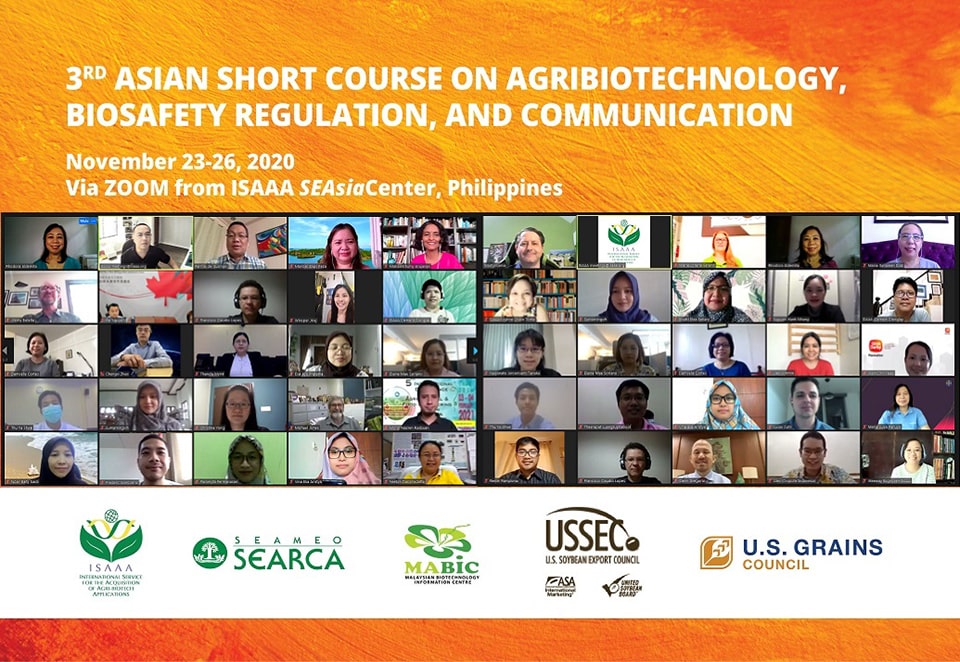
Reinforcing SEARCA's commitment to become a leading enabler and champion of excellence in agricultural and rural development (ARD), the Center sent young professionals and current scholars from across Southeast Asia to the 3rd Asian Short Course on Agri-biotech, Biosafety Regulation, and Communication (ASCA) held through online platforms from 23 to 26 November 2020.
The four-day short course was organized by International Service for the Acquisition of Agri-biotech Applications (ISAAA) together with SEARCA, the Malaysia Biotechnology Information Center (MABIC), the US Soybean Export Council, and the US Grains Council. It was designed to enable participants to better understand the following key concepts: (a) entire value chain related to research, development, commercialization, and trade of living modified organisms (LMOs); (b) national and international legal instruments related to LMOs; (c) effective communication of Agribiotechnology and biosafety regulation; and (d) communicating Agribiotechnology in social media.
Amidst the pandemic, ASCA saw an increase in participation compared to the previous years with attendees from 12 different countries in North America, South America, and Asia and Oceania while 42 Asian scientists, policymakers, and regulators participated in the online course held via Zoom.
Coming from multidisciplinary and cross-cultural origins and diverse perspectives, SEARCA's Grantees gained deeper insights on the current state of agri-biotech in their respective countries and how they can contribute to its advancement in their fields of expertise.
For Reniel Pamplona, an Assistant Professor from the University of the Philippines Los Banos (UPLB), the discussions showed that the Philippines is fortunate to have a regulatory framework for GM Crops since most neighboring countries are either starting or still drafting the frameworks for the regulation of their GM products.
Meanwhile, according to Vina Ekta Aristya, a researcher from the Universitas Gadjah Mada in Indonesia, the course enabled her to gain experience and knowledge to drive the modern biotechnology in agriculture in her country and explore new opportunities in plantation and agriculture industry management globally.
A biologist from Universiti Putra Malaysia, Christina Yong found the course mind-opening, especially since she is working mainly on fundamental research and only started to venture into biotechnology. "The short course highlighted the potential applications of biotechnology, and the regulations/policies involved when it comes to GMOs. I hope to apply biotechnology for crop improvement in my future work. My main take-away from this short-course is that biotechnology is good and it must be used ethically at the same time," she added.
"My participation in ASCA has deepened my understanding and appreciation of agri-biotech," according to Atty. Damcelle Cortes, an Assistant Professor from UPLB. "The course has definitely increased my interest to be more engaged in the agri-biotech discourse so I intend to take other related online courses and webinars on the topic, and find opportunities to take part in other research, policy and regulatory initiatives where my law and governance background can be useful," she added. Atty. Cortes also expressed interest to probe further and possibly engage in research applying a development perspective to agri-biotech.
Another grantee from the Philippines, Melodee de Castro, also an Assistant Professor from UPLB, also plans to use the learning and updates from the course in writing the modules for the Agribusiness Executive Program which is still currently in its inception phase. "The updates on the country regulatory status will help further researches in the field of Agribiotechnology and Food Safety in the field of Agribusiness," she noted.
A total of eight participants were supported through SEARCA's University Consortium Grants and Travel Grants Program. These grants provide opportunities to qualified individuals in the fields of agriculture and related sciences in Southeast Asia to contribute to ARD in the ASEAN region through graduate studies, instruction, research, innovation, and extension work that are anchored on the Center's priority thrusts.